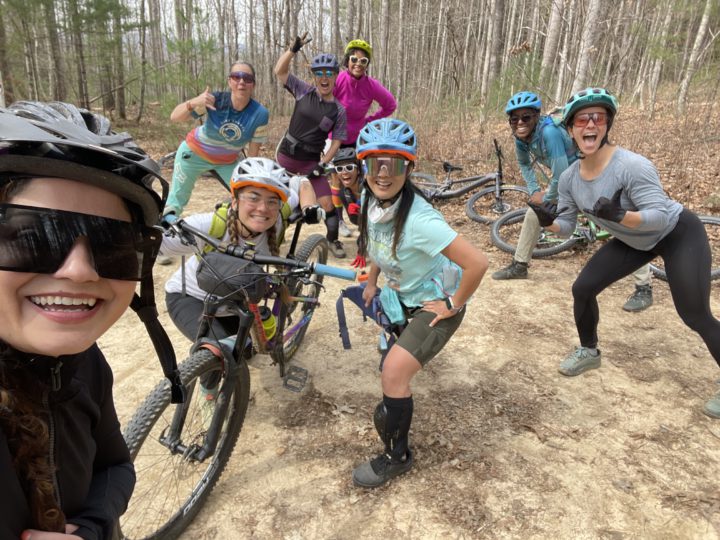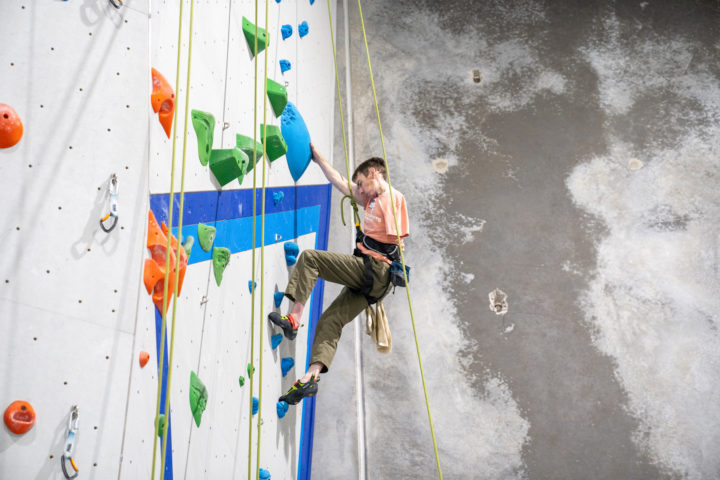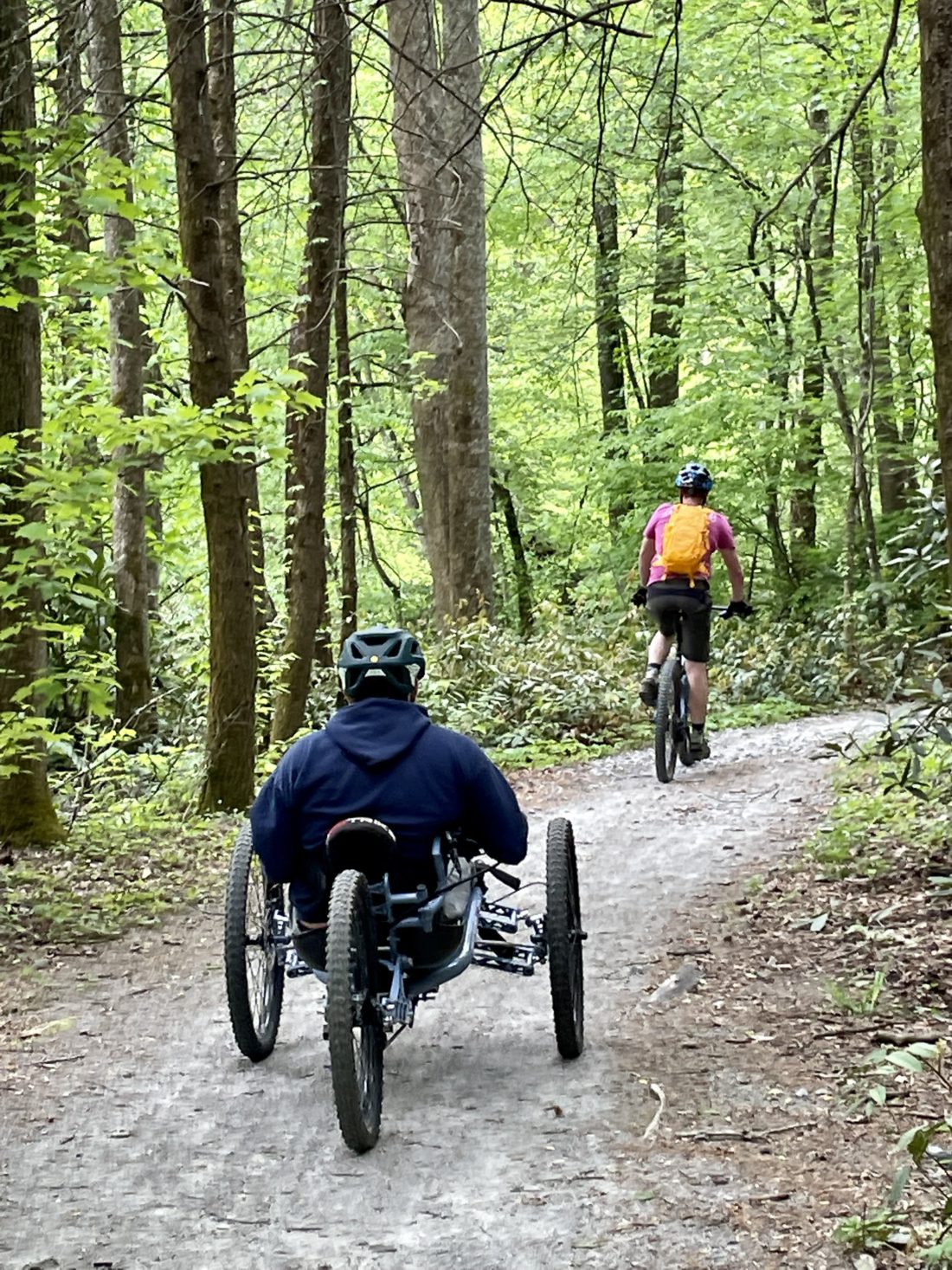Matthew Kirby says he’ll never forget the time he took a woman biking in Dupont State Forest as a volunteer with Catalyst Sports, a nonprofit that helps people with disabilities get out into the outdoors. He decided to take a short break in a field and explained the history of the woodland. But within minutes, he was eager to get back on the trail.
He asked the participant, “All right, do you want to go do this trail?’” he remembers. “And she said, ‘I just kind of want to hang out here, because I’ve never been in a forest before.’”
That memory still hits Kirby deeply, he says, because it demonstrates so clearly that people with disabilities or other barriers are often left out of activities that many people take for granted.
Catalyst, which offers adaptive mountain bikes and climbing gear, is just one of several local organizations and individuals working to get people of all races, backgrounds and abilities to participate in outdoor recreation throughout Western North Carolina. And a new grant is ready to offer support.
The Outdoor Equity Fund, a $125,000 grant program launched earlier this year, aims to support individuals and organizations who are focused on advancing equity in outdoor recreation. The fund was created by nonprofit Made By Mountains, a collaboration of Mountain BizWorks, Outdoor Gear Builders of WNC and the N.C. Outdoor Recreation Industry Office. It offers microgrants to support skill building and professional development for those working to make the outdoors accessible to all.
“There was some interest in identifying what barriers exist in Western North Carolina for historically marginalized groups. There’s a lot of grassroots initiatives, but there isn’t always the funding support,” says Iliana Hernandez, who is facilitating the fund’s working group. “This fund came out of the affirmation that there is a lot of that work being done, that there is a need for it and there is motivation.”
Left out
While the mountains of Western North Carolina are known for their seemingly endless hiking trails, waterfalls, mountain climbing and more, not all people have had the ability to enjoy them. People from marginalized groups, including people of color and those living with disabilities, are often left out of outdoor activities due to social issues or lack of accessible spaces.
“Traditionally, access to outdoor sports has been limited for people with different disabilities,” says Kirby. “A lot of our Western North Carolina trailheads aren’t the most accessible, with chunky gravel parking lots or portable bathrooms that aren’t accessible.”
At Catalyst, Kirby coordinates free monthly group rides that often draw dozens of folks on adaptive bikes. He says that the group has grown over the years.
“We’re definitely gaining visibility in Western North Carolina, which is increasing our ride numbers,” he says.
Other groups also feel left out when it comes to enjoying the outdoors. Diana Parra founded the group, Riding in Color WNC, to organize rides for Black, indigenous and other people of color. Parra says the reasons that people of color have been cast out of outdoor recreation are numerous. She notes that as a Latin American immigrant, she “wanted to assimilate as much as possible for the sake of safety” because the potential to stand out, especially when exploring isolated areas while hiking or mountain biking, could pose risks.

“As a person of color, when you’re out in the woods, when you’re out at the river, and you sound different — maybe you are louder because culturally, we just speak differently and engage differently. Not only are there looks and comments, but often the cops get called on us,” she says. “We are not just made to feel like we don’t belong, but we are explicitly told that we don’t belong.”
Parra started organizing mountain bike rides in 2021 and found that it offered a safe space for nonwhite community members to learn new skills and enjoy the therapeutic benefits of the outdoors without feeling the need to be vigilant about their surroundings.
“There’s the inherent risk of doing something like mountain biking and climbing, where our nervous systems are activated…. And, there is an inherent risk in being a person of color in this country. And so in a fundamental way, people of color are already in a place of activation moving in predominantly white spaces,” says Parra, who also works as a therapist. “And part of what [these rides] do is turn down the volume of activation by creating a space where there’s folks who have parallel experiences of oppression and there’s less having to explain things, less having to feel like you’re on guard.”
Offering support
While the Made By Mountains partnership has been around since 2013 with the goal of growing and highlighting the outdoor economy in the Western North Carolina, the new Outdoor Equity Fund seeks to empower organizations and groups such as Catalyst and Riding in Color to bring new voices into the industry.
“What I really love about this is that we are seeing a lot of these initiatives coming from community that are exactly for the community,” says Hernandez.
Made By Mountains received 44 applications from individuals, organizations and informal groups in May, requesting grants anywhere from $300 to $10,000 to expand programming, provide training or purchase equipment.
“We were worried about our own kind of geographical capacity — that it would just be Asheville folks that applied — but it wasn’t,” adds Joanna Brown, communications manager for Made By Mountains. “[The grant applications were] spread out across this entire region. I’m really excited to see a lot of our rural communities represented and people and organizations that are ready to make stuff happen.”
The grant is funded by an Appalachian Regional Commission Power Grant, a partnership between federal and state governments that focuses on 423 counties across Appalachia.
Both Catalyst and Riding in Color applied for grant funding. Parra says her group hopes to become certified mountain biking instructors and purchase a small fleet of bikes for participants to use, while Catalyst would use the funding to expand its adaptive mountain biking program.
“What I think is so meaningful and powerful about this kind of grant opportunity is that it is shifting power by giving money to the people who are closest to creating these spaces right now,” says Parra.
“We’re proud to support the Outdoor Equity Fund’s mission and fingers crossed we get our first win,” adds Eric Gray, founder and executive director of Catalyst Sports.

A more equitable future
Hernandez says that the seven-member Outdoor Equity Fund working group is reviewing applications. Applicants will be notified in early July and grantees have a year to fulfill projects.
Depending on the outcomes of the grant projects, Brown says that she hopes that the fund will be replenished.
“This is not just giving money, but also that support that comes along with it that says, ‘We see what you’re doing and we believe in it is important for the future of our outdoor spaces,’” she says.
Parra and Kirby see the need.
“There is unwinding of our nervous system that can happen when we find that sense of peace and belonging outside, that doesn’t really happen in the same place, elsewhere,” says Parra.“Spending time outside is something that is so inherently healing to our nervous system. It can be a part of addressing what years of trauma have created in their bodies — in all our bodies.”
“Everybody should have the opportunity to enjoy everything that I enjoy and what brought me to Western North Carolina,” adds Kirby.






Before you comment
The comments section is here to provide a platform for civil dialogue on the issues we face together as a local community. Xpress is committed to offering this platform for all voices, but when the tone of the discussion gets nasty or strays off topic, we believe many people choose not to participate. Xpress editors are determined to moderate comments to ensure a constructive interchange is maintained. All comments judged not to be in keeping with the spirit of civil discourse will be removed and repeat violators will be banned. See here for our terms of service. Thank you for being part of this effort to promote respectful discussion.